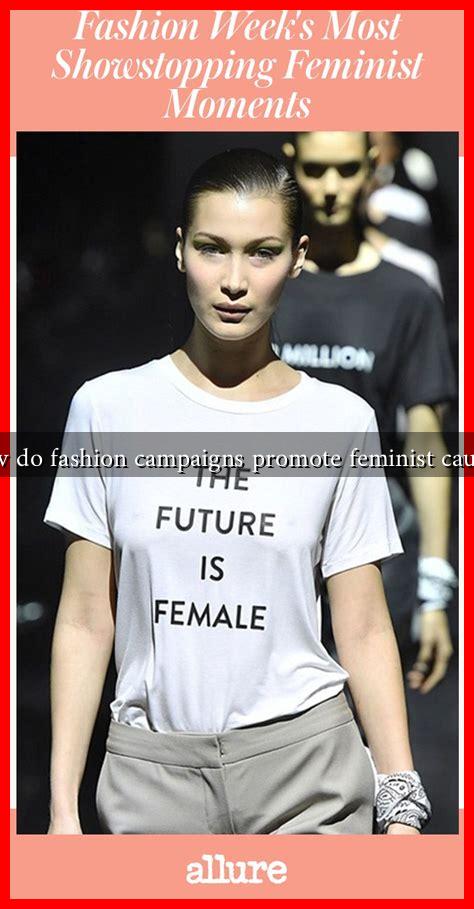-
Table of Contents
- How Do Fashion Campaigns Promote Feminist Causes?
- The Intersection of Fashion and Feminism
- Case Studies of Feminist Fashion Campaigns
- 1. Dove’s Real Beauty Campaign
- 2. Aerie’s #AerieREAL Campaign
- 3. Gucci’s Chime for Change
- The Role of Social Media in Amplifying Feminist Messages
- Conclusion: The Future of Fashion and Feminism
How Do Fashion Campaigns Promote Feminist Causes?
Fashion has long been a powerful medium for self-expression, but in recent years, it has also become a platform for social change. Many fashion campaigns are now actively promoting feminist causes, using their influence to challenge societal norms and advocate for gender equality. This article explores how fashion campaigns are leveraging their reach to support feminist movements, highlighting key examples and the impact they have on society.
The Intersection of Fashion and Feminism
Fashion and feminism may seem like unlikely allies, but they share a common goal: empowerment. The fashion industry has the ability to shape perceptions and influence behavior, making it a potent tool for promoting feminist ideals. Here are some ways in which fashion campaigns are aligning with feminist causes:
- Challenging Beauty Standards: Many campaigns are redefining traditional beauty norms by featuring diverse models of different sizes, ethnicities, and ages.
- Highlighting Women’s Issues: Fashion brands are increasingly addressing issues such as gender-based violence, pay inequality, and reproductive rights through their campaigns.
- Supporting Female Creatives: By collaborating with women designers, photographers, and artists, fashion campaigns are amplifying female voices in the industry.
Case Studies of Feminist Fashion Campaigns
Several fashion brands have successfully integrated feminist messages into their campaigns, creating a significant impact on both consumers and the industry. Here are a few notable examples:
1. Dove’s Real Beauty Campaign
Dove’s Real Beauty campaign, launched in 2004, aimed to challenge conventional beauty standards by featuring women of all shapes, sizes, and ethnicities. The campaign sparked a global conversation about body positivity and self-acceptance, resonating with millions of women. According to a study by the American Psychological Association, exposure to diverse representations of beauty can improve women’s self-esteem and body image.
2. Aerie’s #AerieREAL Campaign
Aerie, a lingerie brand, has taken a strong stance against retouching images in its advertising. The #AerieREAL campaign promotes body positivity and authenticity, showcasing unretouched photos of models. This initiative has not only garnered a loyal customer base but has also encouraged other brands to adopt similar practices. Aerie reported a 20% increase in sales following the launch of this campaign, demonstrating the market’s appetite for authenticity.
3. Gucci’s Chime for Change
Launched in 2013, Gucci’s Chime for Change initiative focuses on empowering women and girls around the world. The campaign raises funds and awareness for various women’s issues, including education, health, and justice. By collaborating with influential figures like Beyoncé and Salma Hayek, Gucci has successfully brought attention to feminist causes while reinforcing its brand identity as a socially responsible entity.
The Role of Social Media in Amplifying Feminist Messages
Social media has played a crucial role in the success of feminist fashion campaigns. Platforms like Instagram and Twitter allow brands to reach a global audience and engage directly with consumers. Here are some ways social media enhances the impact of these campaigns:
- Real-Time Engagement: Brands can interact with their audience instantly, fostering a sense of community and shared values.
- Viral Potential: Compelling campaigns can quickly go viral, spreading feminist messages far beyond traditional advertising channels.
- User-Generated Content: Encouraging consumers to share their own stories and experiences can create a powerful narrative around the brand’s message.
Conclusion: The Future of Fashion and Feminism
Fashion campaigns are increasingly becoming a vehicle for promoting feminist causes, challenging societal norms, and advocating for gender equality. By leveraging their influence, brands can create meaningful change and inspire consumers to engage with important social issues. As the industry continues to evolve, it is essential for fashion brands to remain committed to these causes, ensuring that their campaigns not only reflect the values of their consumers but also contribute to a more equitable society.
In summary, the intersection of fashion and feminism presents a unique opportunity for brands to make a positive impact. By challenging beauty standards, highlighting women’s issues, and utilizing social media effectively, fashion campaigns can play a pivotal role in advancing feminist causes and empowering women worldwide.
For more insights on the intersection of fashion and social issues, visit Fashion for Good.

